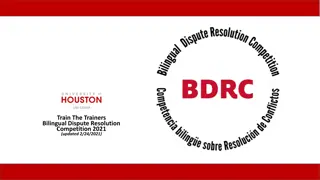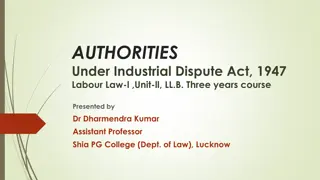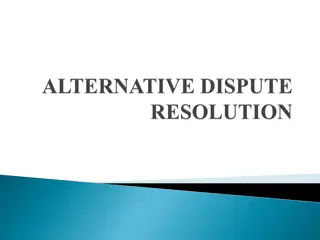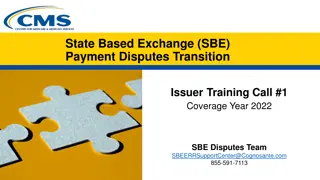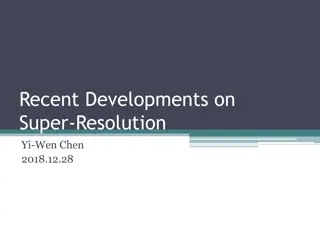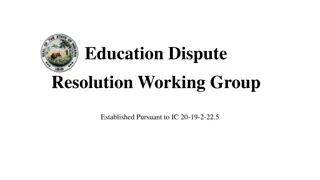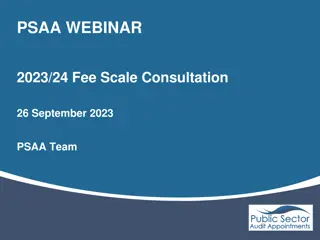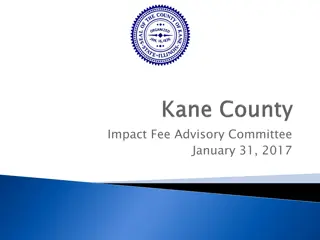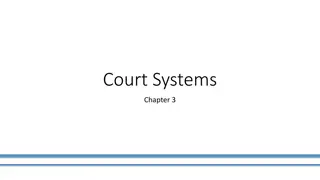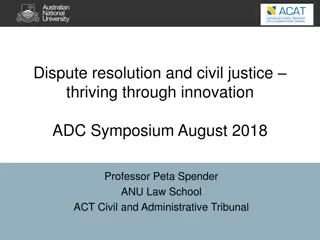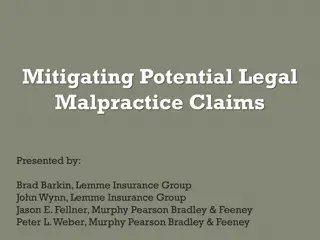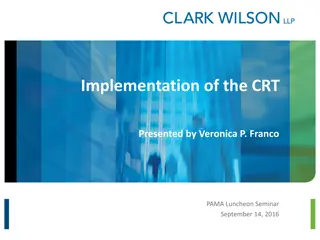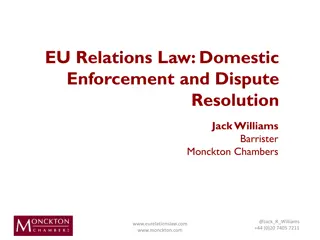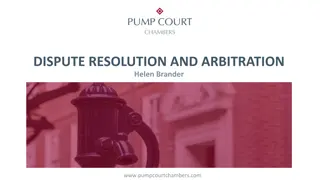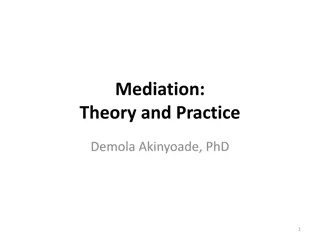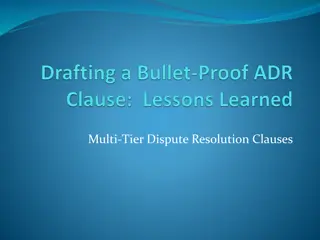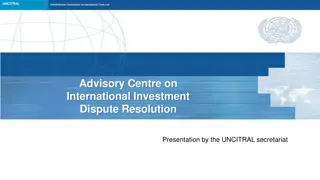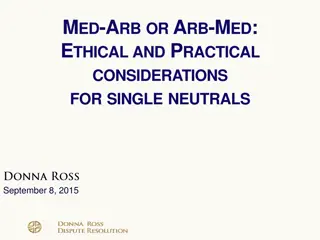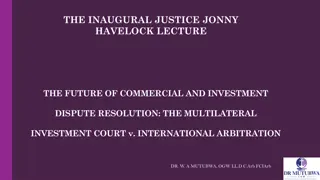Texas DWC Medical Fee Dispute Resolution Overview
The Texas Department of Insurance, Division of Workers Compensation offers Medical Fee Dispute Resolution (MFDR) services to help healthcare providers resolve disputes with insurance carriers over medical bills. MFDR specializes in DWC medical fee guidelines, billing policies, and reimbursement calculations. Healthcare providers like clinics, hospitals, pharmacies, and more can file disputes for review and decision. Deadlines and instructions for filing are crucial to avoid dismissal. Before filing, providers should review Explanation of Benefits (EOB), request reconsideration from the insurance carrier if needed, and gather necessary documentation.
Download Presentation

Please find below an Image/Link to download the presentation.
The content on the website is provided AS IS for your information and personal use only. It may not be sold, licensed, or shared on other websites without obtaining consent from the author.If you encounter any issues during the download, it is possible that the publisher has removed the file from their server.
You are allowed to download the files provided on this website for personal or commercial use, subject to the condition that they are used lawfully. All files are the property of their respective owners.
The content on the website is provided AS IS for your information and personal use only. It may not be sold, licensed, or shared on other websites without obtaining consent from the author.
E N D
Presentation Transcript
Medical Fee Dispute Resolution for Health Care Providers Medical fee dispute resolution is a service of the Texas Department of Insurance, Division of Workers Compensation (DWC). MDRinquiry@tdi.Texas.gov 1
Who We Are Medical Fee Dispute Resolution, often referred to as MFDR, is a program that is part of the Division of Workers Compensation. We specialize in DWC s medical fee guidelines, medical billing and payment policies, and calculating DWC reimbursement amounts for health care services. 2
What We Do Resolve disputes filed by health care providers against workers compensation insurance carriers over denials or reductions in medical bills. Review the positions and documents submitted by the health care provider and the insurance carrier involved in the fee dispute. Make decisions based on the facts provided to us. Issue written findings and decisions to the parties. Publish decisions on the TDI website. 3
Who Can File Medical Clinics Hospitals Doctors Offices Physical Therapy Clinics Pharmacies Ambulatory Surgical Centers (ASC) Durable Medical Equipment (DME) Providers or Suppliers Other Health Care Providers Occupational Therapy Clinics 4
When to File (deadlines) One year after the date the health care service was provided; 60 days after finalresolution of a compensability, extent of injury, or liability dispute; or 60 days after final resolution of a medical necessity dispute. 5
Filing the Fee Dispute Failure to follow instructions or provide all documentation may result in a dismissal. 6
Before Filing: 1. Read your initial explanation of benefits (EOB) The following are examples of issues that can be addressed at fee dispute resolution: Time limit for filing has expired. The information submitted does not support the level of service. Workers compensation jurisdictional fee schedule adjustment. There was no preauthorization. 2. Request reconsideration Health care providers must ask for reconsideration from the insurance carrier. MFDR looks for proof of a reconsideration in every fee dispute filed. If the insurance carrier did not respond to your request for reconsideration within 30 days, send proof of your request. 7
How to File Health Care Provider A complete DWC Form-060 is required. 8
How to submit the DWC Form 060 How to submit the DWC Form 060 Health Care Providers may submit disputes by any ground mail, personal delivery ,or electronic transmission as described in Texas Administrative Code 102.5 of this title. Electronic transmission options include: Fax: 512-490-1044 Email: MedFeeDispute-Submission@tdi.texas.gov SFTP: DWC offers electronic filing options through SFTP. For more information, contact DWC at e-Filing- Help@tdi.texas.gov or visit our website at www.tdi.texas.gov/wc/carrier/efileoptions.html A Health Care Provider or Pharmacy Processing Agent Should Submit A copy of all medical bills related to the dispute. A copy of all medical bills submitted to the insurance carrier for reconsideration. A copy of each explanation of benefits (EOB) related to the dispute (or convincing evidence that the insurance carrier received the request for EOB). A copy of the final decision regarding compensability, extent of injury, liability, or medical necessity for the health care related to the dispute, if applicable. A copy of all applicable medical records related to the dates of service in dispute. A position statement of the disputed issues in accordance with 28 TAC 133.307(c)(2)(N). If the dispute involves health care for which DWC has not established a maximum allowable reimbursement or reimbursement rate, documentation that discusses, demonstrates, and justifies that the payment amount being sought is a fair and reasonable rate in accordance with 28 TAC 134.1 or 134.501, as applicable. A signed and dated copy of the agreement between the agent and the pharmacy (applies only to pharmacy processing agent). Other documentation the requestor believes is applicable to the medical fee dispute. 9
Exclusions Examples of issues that cannot be addressed at fee dispute resolution: EOB denials that health care was not medically necessary . EOB denials that health care was not related to the compensable injury , does not extend to the compensable injury , based on extent of injury , or carrier not liable . Services covered through a 1305 Health Care Certified Network with which you are contracted, e.g., Texas Star Network, Texas WorkWell, or Coventry. Services covered by Department of Labor, e.g., the injured employee is employed by a federal agency. Services are covered by the Federal Longshore Act. 10
Exclusions (cont.) For information on how to resolve disputes over: denials that the services were not medically necessary , see the TDI website. denials that the services were not related to the compensable injury or did not extend to the compensable injury , see the TDI website. reductions or denials made by a 1305 Health Care Certified Network, refer to the complaint section of your network contract or contact the network. 11
Q: Can a health care provider file a fee dispute by electronically? A: Yes. Disputes may be submitted by fax, secure email, or through Secure File Transfer Protocol(SFTP). 13
Q: Can I discuss my active, pending fee dispute with the person assigned to my case? A: No. Dispute resolution officers cannot have direct contact with either party. 14
Q: I disagree with the insurance carriers response. Can I send a rebuttal or more information? A: Any new information or positions should be addressed to the insurance carrier with a file copy to the MFDR program. 15
Q: How can I check the status of my fee dispute? A: Email MDRInquiry@tdi.Texas.gov, or call CompConnection at 800-252-7031, option 3. 16
Q: How will I know when my fee dispute is resolved? A: DWC will send you a decision letter or a dismissal letter by fax. 17
Q: What happens to a fee dispute filed after the one-year filing deadline? A: A zero order decision is issued. The order cites the timely filing requirement and notes the key facts that led to the determination. 18
Q: Can I appeal a fee dispute decision? A: Yes. For instructions on how to appeal the fee dispute decision, see the Right to Appeal section of the decision. 19
Q: Can I appeal a fee dispute dismissal? A: No, but you may correct the issue and re-file. For example, if a fee dispute was dismissed because there was no evidence of reconsideration, you may file a new dispute that includes that proof. Note that the one-year filing deadline applies when you file a new dispute. 20
Q: What do I do if I receive a payment from the insurance carrier after I filed a medical fee dispute? A: Notify DWC by emailing: MDRInquiry@tdi.Texas.gov. 21
Q: How long does dispute resolution take? A: For typical disputes, resolution occurs within 90 days from the day the dispute is received. Disputes with complex issues, new issues, or issues under litigation make take significantly longer. 22
We hope you found this information helpful and thank you for your time and attention. Email us at: MDRInquiry@tdi.Texas.gov 24







